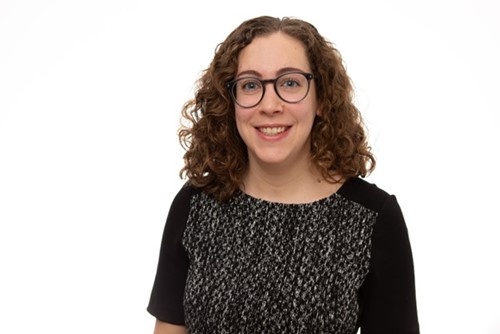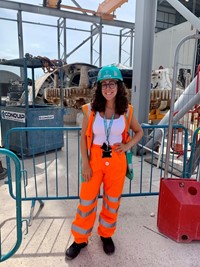Association for Project Management
|
|
Women’s History Month: ‘Let’s tackle unconscious bias in the project profession’
March is Women’s History Month; an opportunity to talk about women’s contribution to history but also to reflect on issues relevant to women in the present. Association for Project Management (APM) spoke with Styliana Kiliaris, Committee Member of APM’s Women in Project Management Specific Interest Group, about gender equality in the project profession and leadership opportunities for women.

Styliana Kiliaris joined the project profession approximately three years ago, having previously worked in accounting. She was drawn to a career in project delivery because – as she put it – it gave her the chance to see what the numbers on the page are actually contributing to.
Styliana is now a Senior Project Controls Engineer working within the real estate sector. She talks about her work with great enthusiasm, and is thinking long-term about professional development and career progression. But she feels there’s a discrepancy in her sector between the number of men and women in project leadership roles.
Aggregated data from APM’s most recent surveys of project and programme professionals indicates a sizeable majority of people working in the profession are men. APM’s most recent Salary and Market Trends Survey reported that, while there are reasonably even splits for mid-level and administrative roles, the balance skewed heavily in favour of men when it comes to senior roles such as Head of Projects, Project Director and PMO Director. The survey report notes that the amount of women in these roles is increasing, but this isn’t being observed everywhere, as Styliana attests.
“In my previous project and on my current project, all my bosses are male,” she recalls. “Those [salary survey] figures sound quite high to me.”
While Styliana agrees that more can be done to encourage women and non-binary people into the profession, she feels unconscious bias – the act of making decisions or judgements based on prior experience, personal beliefs or assumptions without realising it – may be a factor when it comes to men taking the majority of leadership positions.
“There is a lot of unconscious bias around,” she said. “People probably don’t realise, but I think a lot of men are getting promotion opportunities over women.
“Previously, I’ve been involved with job interviews where both the male and female applicants had children. When debating who was best for the role, it was mentioned that the female had children, but there was no mention that the male did. This is a great example of unconscious bias. Let’s start to question these unconscious biases and call them out. I think there is a lot to learn around this as we don’t realise when we are doing it.”
With equality and diversity high on the business agenda, Styliana has taken opportunities for inclusivity training and worked as an inclusivity champion; something to which she says project team members responded well. She has also been encouraged by what she sees as greater openness and a willingness to learn among male colleagues and line managers with whom she’s worked over the years.

She explained: “I have definitely seen a positive change over time. In one of my first graduate jobs, I was asked by a male during the interview if I plan to have children and when I plan on doing so.’ I doubt that would happen today.
“I think we’re seeing a generation now where things are changing. A positive that has emerged post-pandemic is that men are doing more traditionally ‘female’ tasks, like the school run.”
Will the profession ever reach a truly even gender split within leadership roles? Styliana is hopeful, but sees this as a long-term aspiration. For now, she is calling on men in the project profession to become allies to women, not only by encouraging more women into the profession but by giving them equal opportunities to demonstrate their abilities, which will help create pathways to progression.
The importance of diversity and inclusion in project management is well documented. Styliana is confident encouraging more diversity of thought on projects will ultimately benefit everyone, including end users.
“I’m a big believer in having the right person for the job…no one wants arbitrary targets. While I would like to see an even gender split one day, any increase over where we are now will be welcomed.
“A lot of project management is people management,so the broader range of people you have on your team, the greater the sharing of experiences and knowledge, the better.
“That’s what is so special about the Women in Project Management Specific Interest Group (WiPM SIG). It’s about women in projects, but the SIG promotes inclusivity for everyone, regardless of race, gender or age.”
Join the conversation
To mark Women's History Month, APM will be holding a LinkedIn Live panel discussion, ‘Future Focus: Women in Projects’ on Wednesday 20 March, 12:00-13:00 GMT. You can read more and register to join here.
APMs WiPM SIG is committed to the development and promotion of women in project, programme and portfolio management environments. The group promotes investment in gender diversity to create opportunities for all professionals to develop their careers. You can read more about this SIG and follow for the latest updates here.
Original article link: https://www.apm.org.uk/news/women-s-history-month-let-s-tackle-unconscious-bias-in-the-project-profession/
- RESOURCES
- MEMBERSHIP
- CHARTERED STANDARD
- QUALIFICATIONS AND TRAINING
- JOBS AND CAREERS
- NEWS AND OPINION
- COMMUNITY
- EVENTS
- BOOKS


